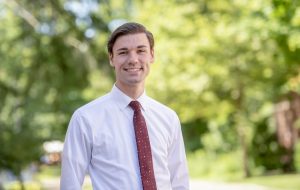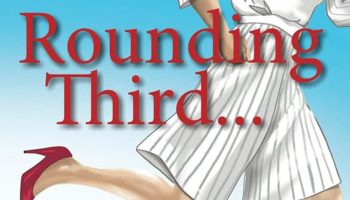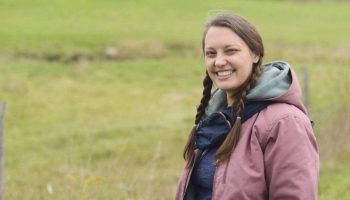
Described as a young John Kennedy, Pete Buttigieg and Barack Obama by older women on the campaign trail, Austin Morgan is making a splash in New York State politics.
The 22-year-old, recent Cornell University graduate from Freedom, New York, is the Democratic candidate running for State Senate in District 57, against Republican Chautauqua County Executive George Borrello. If elected, Morgan would be the youngest state senator in New York history.
His scrappy team of also recent-college-grads puts 1,000 miles a week on their van, he said, traveling across the Southern Tier to shake hands, march in parades and rub shoulders with his potential constituents.
When asked how he’d describe his boots-on-the-ground, “people over politics” campaign, Morgan said “independent, energetic, genuine.”
What made you get into politics, and why did you decide to run now?
I grew up in a little town called Freedom. I grew up in a very apolitical household. My mom did not register to vote until I launched my campaign. We thought if we were far enough away from politics, if we don’t pay attention to it, it won’t affect us — and that’s not true. I think a lot of America is like that.
When 2016 happened, that opened everybody’s eyes, I think, a little bit. So 2016 was a really transformative year when we had new voices — some good, some bad, some louder than others. It woke me up out of that “Don’t listen to politics, it’s not going to affect you” (mindset).
I started looking around and I thought, “The system isn’t working for most of us.” The economy is not working for the working class — people like my parents — the taxes in New York State are too damn high, and so I just saw how our leaders were not, in fact, leading to better solutions. We were recycling the same politicians and policies, just switching back and forth between parties.
Even at that point, I didn’t plan to go into politics. … I studied education policy (at Cornell) and through that, I got the opportunity to work for the State Senate. … Even after all of that, politics wasn’t the plan. … Then (former State Sen.) Cathy Young resigned in late February, early March, and I thought, “We are going to hurt without that representative, we are going to hurt because we don’t have a voice anymore.”
For someone who has seen Albany up close, it was even more salient how troubled our region was. … We were on the edge of a cliff.
Someone young, someone with experience in how the State Senate works, someone from a new generation, someone with new ideas and a fresh face is exactly what we need. So I submitted my candidacy.
Why choose to run so young? How do people respond when you tell them you’re 22 years old?
I think I bring something unique to the table. I think this is also the time for young representation, for a new generation to step in and lead. We’ve allowed the same politicians for decades to try the same things over and over, and that’s the definition of insanity — that’s why we’re in such a bad place.
With the student debt crisis, with the economy on a knife’s edge, with climate change happening, with income inequality at historic levels we haven’t seen since the Great Depression, my generation has everything to lose if we don’t act right now. I could not convince myself that trusting someone without skin in the game to fix the problems that I needed fixed was the solution.
Young people, especially in rural areas, are not engaged in politics because it’s so often these political machine-based popularity contests, and I’m proud not to have gone through that process, and I’m proud that for so many people I’m why people registered to vote for the first time in their lives.
There were reasons not to run, but I think there were a lot more reasons to do it.
The youngest state senator right now (Julia Salazar for New York District 18) … is a self-described democratic socialist. … For me, (running) was about offering (to democratic socialism), saying, America is broken but it’s not because of capitalism, it’s not because of the system we entrust. It’s due to individuals and systematic oppression.
People are ready again to be hopeful, which is something we haven’t been in a long time.
What are the foremost issues facing rural New York?
I think there are a lot of issues that we haven’t faced for decades, really, in either party. We have an economy that doesn’t work for the working class — it works for Wall Street, but it doesn’t work for Main Street — we have systemic problems with our education system, and we have children graduating without the skills necessary to be successful.
We haven’t acted on climate change, which affects my future, my parents’ immediate future and my children’s lives. The backbone of our state economy, which is agriculture, is going by the wayside. All of that combined falls under the idea of the representation.
Obviously the population center in this state is New York City and downstate. We have gotten to a breaking point where our voices (in upstate) have been silenced for so long, that we’ve been neglected for so long.
The real problem is that our governor, most of our state senators, most of our assembly members go to the Albany bubble, they go to their fancy offices, they stay in office for decades — longer than they should — and they lose touch with the people like my parents; with the farmer who is taking out more and more loans to get by each year; with the small business owner who is buried under a pile of red tape. They lose touch with those people on the ground. They stop listening, and they speak more than they should. … There’s just a great deal of distance between our representatives and who they are representing.
New York State contains the nation’s largest metropolitan area and rural Upstate New York. How do you plan on bringing issues the rural areas face to the legislature’s floor?
As humans and New Yorkers, we’re so much closer than we’re led to believe. People in Queens may want different things in terms of some policy, but 99% of people want the same things: We want our kids to go to a good school; we want to be able to keep the lights on; we want to put food on the table; and hopefully, we’d want that tax bill to go down at the end of the year.
What is the biggest opposition to your campaign?
There’s a statistical disadvantage to this campaign. … How do you cure that? (So,) I show up, and more than that, I listen. Unlike previous Democratic candidates and unlike Republican candidates, I’ve been more than willing to go anywhere and talk to anyone. I have no misapprehension about the fact that I need a significant number of Independents and Republicans to vote for me.
But we show up; we’re honest, we’re transparent, we’re genuine. … My campaign has made it our mission to show up where the people are instead of asking them to come to us.




